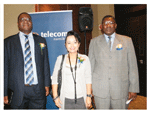
Fraud a threat to telecoms sector
 Fraud poses a major threat to the telecommunication sector, a workshop hosted in Windhoek heard this week. Delegates from a number of southern African countries gathered in Windhoek to analyse the techniques used to detect and locate perpetrators of electronic crimes in the sector.
Fraud poses a major threat to the telecommunication sector, a workshop hosted in Windhoek heard this week. Delegates from a number of southern African countries gathered in Windhoek to analyse the techniques used to detect and locate perpetrators of electronic crimes in the sector.
The delegates also deliberated on how effective fraud management systems can help detect and reduce telecoms fraud, find effective ways of conducting investigations in telecoms in order to achieve best results, as well as develop strategies to provide adequate barriers against fraud in subscriber prepaid systems.
Chie Wasserfall, acting managing director of Telecom, said that the Communications Fraud Control Association (CFCA) estimates that loss to fraud in the sector is estimated to amount to N$80 billion.
“Telecom operators are reporting fraud loses averaging between 1% and 4.5% of their total revenue,” Wasserfall added.
The CFCA 2009 Global Fraud Loss Survey shows that worldwide industry experts surveyed estimated annual global fraud losses to be in the range of US$ $72 to US$80 billion, up 34% from the CFCA Survey results of 2005.
“These fraud losses represent approximately 4.5% of Telecom revenues, which is a 0.6% decrease from the 2005 survey. The main reason for the decrease is because the growth in global revenues outpaced the growth in fraud losses,” states the report.
Stanley Simataa, Deputy Minister of Information and Communication Technology, said that telecommunication fraud is set to rise with the advent of new mobile services such as 3G and voice over internet protocol.
“Therefore, leakage, including fraud related, across the revenue chain remains a challenge for all operators. While operators in developing markets face a wide range of issues including the upfront challenge of high revenue leakages, operators in developed markets are faced with insufficient data to accurately identify and recover most of the estimated leakages,” Simataa said.
To address poised threats, managing fraud has become a priority for those operating in the telecommunications sector.
“It is important for operators in the region to work closely together to combat network fraud. Telecommunications fraud is a growing problem all over the world,” Wasserfall emphasised.
The three-day workshop also looked at identifying key issues surrounding strategic risk management of network fraud, security and interconnection bypass as well as address internal fraud, combat fraud and security in the Next Generation Networks.









































